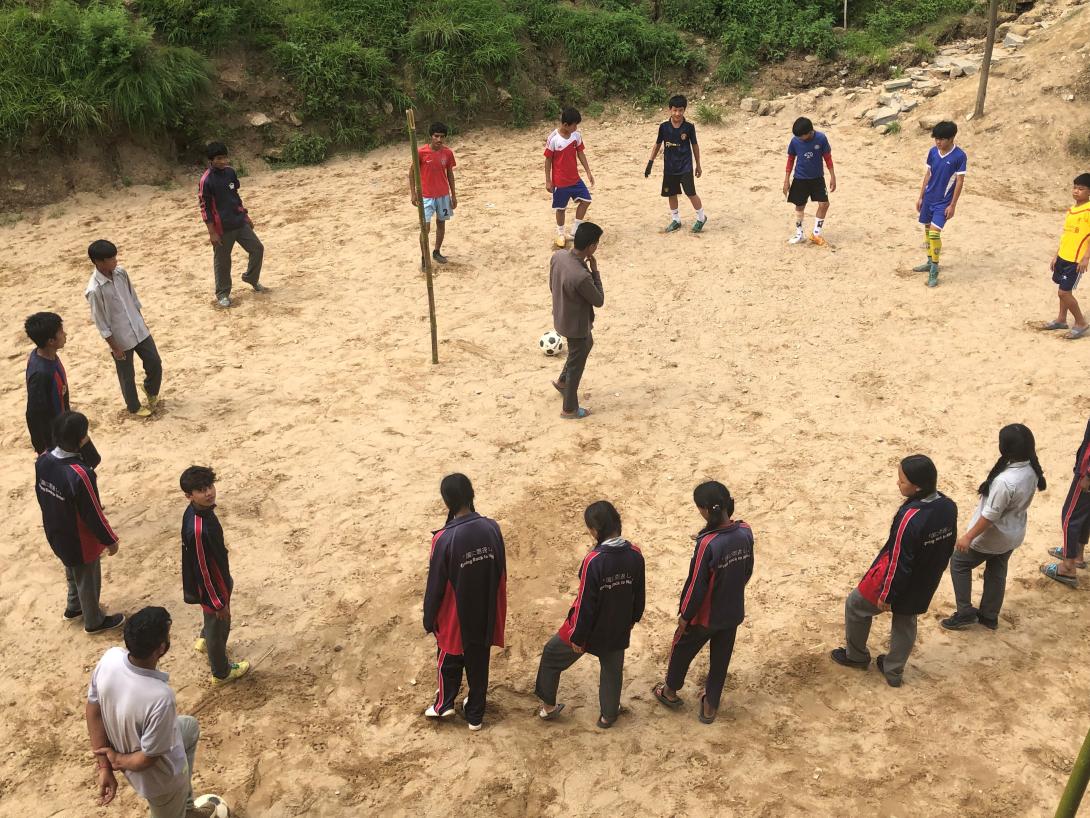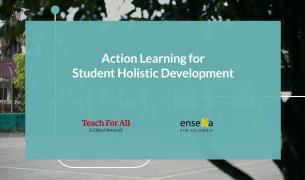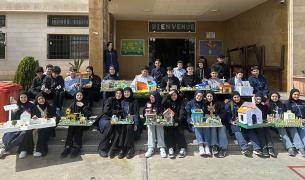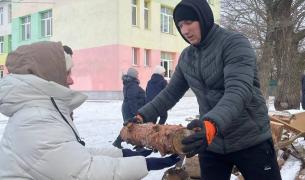Innovation and problem solving: A learning trip to Nepal

I am currently working at Communities Beyond Imaginations (CBI) Innovations Academy, which uses the power of sports (football) to influence educational outcomes, especially of girls. We train students from rural communities on football and self-leadership, and support them to continue their education into high school. We are currently working on starting the construction of a boarding facility for our participants and thus we are looking for possible ideas to be able to create a comprehensive curriculum that builds the best from our participants and makes them enjoy being part of our program. This prompted my visit to Nepal to learn from the Teach For Nepal alumni who are running amazing initiatives.
Through the Teach For All network, I‘ve connected with Mingma Tenzing, a Teach For Nepal alumnus who is a school principal and runs an initiative that empowers girls using football. I connected with Mingma through the Huracan Foundation, an organization founded by Teach First (UK) alumnus Henry May that supports startup football projects in the Teach For All network. Mingma’s project has made a great impact on girls in Nepal and his work has been recognized globally and was recently showcased in the Women's World Cup. I deeply believed I had so much to learn from his work which led to this visit.
Through the Teach For All Communities and Connections Fund, I was able to visit Mingma in Nepal and to learn from his communities and experiences, and to further collaborate to develop a curriculum that integrates education and sports as a catalyst that can be implemented across the Teach For All network. I was also able to learn from Bhawana Shrestha on her community work.
YouMe School: A school of innovation
In Nepal, I visited Mingma in a rural village called Khotang, 200km away from Kathmandu. Mingma and his team at the YouMe School are working to transform the mindset of children by running different enrichment activities. Children can choose these activities based on their interests, which includes football training, music lessons, and science innovations. All programs are made relevant by having an element of solving community problems. I listened to children from Year 4 explain how a biogas digester works and how important it is to save the environment, while another class had young kids produce music with messages that educate the communities on such important matters as education and health. It is powerful to have children understand their community challenges and attempt to solve them at this early age.
The YouMe School is an institution built on the principles of respect, openness, and mutual understanding. While holding dear to the local culture, there is an environment of trying new ideas where the community embraces alternative ways of doing things. One innovation that stands out is the YouMe Dollar, a financial currency which is used for transactions in the YouMe community. Children earn YouMe Dollars for academic excellence, discipline, innovation, kindness, and other life outcomes. Children accumulate their currency until the end of the term where they can purchase food, stationeries, and school fees. I saw the feeling of love that kids carried in this currency that they deeply believed in so much.
The YouMe School philosophy and way of doing things with just very minimal resources challenges the way we do things back home in Uganda. Our classrooms and the mode of teaching has to change in a manner that children don’t just come to school to acquire knowledge but rather come to school to try out the knowledge, our schools must become hubs of solving community problems rather than just teaching about our problems. Our classrooms must create room for our children to fail while trying new solutions; we can’t keep expecting our children to excel all the time—with that thinking they will never become creative. Our classrooms must become locally rooted and globally informed. Let our children first think of solving our immediate community problems, such as climate change and agriculture.
Mingma, through the Huracan Foundation, organized the first ever girls football competition in the Himalayas and I was amazed to learn from him how important that tournament was, how he pulled it off with such minimal resources, how the community embraced it, and how deeply he is grateful for the impact football has made on these girls. I was also interested to discuss the frustrations he expressed about how communities and schools treat girls as far as sports is concerned. We both agreed that rural communities have to innovate on how they can strike a balance of academics and developing students' talents, as both are of great importance to the kids.
Communiversity: Developing problem solving
I also visited Bhawana Shrestha who piloted a community placement project called Communiversity—a program that takes first year college students to rural communities and tasks them to analyze community challenges and come up with locally relevant solutions. I was amazed by the wide critical thinking of a small group of about 30 college students who came up with several solutions such as a water filtering machine to produce clean drinking water and a local heritage advertising website to attract tourists to the community. These students hope to work on them once they get back to college. This community placement program lasted for less than a month but I was amazed by how, in such a short period of time, these students were able to critically identify the community challenges, work together with the community to create solutions, and finally develope a prototype idea. If this small group of students were able to create these amazing ideas, what would happen if each African university student was tasked to create a locally relevant community solution? Africa shouldn’t wait for solutions from somewhere else but rather start invoking creativity and critical thinking in our students to develop African solutions for African problems.
As I look at the YouMe school curriculum and the Communiversity program, I realized how relevant these learning opportunities are to the learners. Learners will be able to understand the real challenges in their communities and develop real first hand solutions to their community challenges.
Key learnings
My big takeaways from my trip to Nepal are:
- Teach children to understand their community and solve problems. The way our schools do things has to change. We have for so long praised good results and academic excellence but have paid less attention to letting our kids critically look into our challenges and try to solve them. We need to teach students to start creating solutions in our own classrooms and motivate the small ideas from our kids that can later grow to big ideas.
- Our schools must be able to create a free and comfortable environment for our kids to think and try out things as opposed to a competitive environment for good grades. We must start nurturing the talents of our kids at an early stage if we want to produce great innovators, critical thinkers, and sportspeople. In Uganda, we tend to start only at university, and my experience in Nepal has made me see that this could be started earlier.
- Take learning out of the classroom boundaries and restrictions. Students love to do their own things and in their own style, we only need to guide and motivate but not restrict and limit their reach. We have to start believing in the possibility of a Grade 1 student becoming a professional football player and we, as teachers, need to support his career at such an early stage. We must start believing in ideas and solutions from our college students and create an enabling environment to try them out. These people have the best ideas but we just don’t trust them and we have never given them an opportunity to try their ideas in our communities.
- Africa must decolonize its education and start believing in the potential of its young generation. Nepali is the language of instruction in Nepal and all its school textbooks have been translated into Nepali. Children learn best when taught in the language they understand best. In Uganda it doesn’t matter how well you have performed in other subjects, as long as you fail English you don’t progress to the next class. This must change, we can’t continue using a foreign language as a measure of intelligence.
- Sports have the power to transform communities. Every child I spoke to in Nepal has a favorite sports personality and their biggest memories at school revolve around sports. Africa celebrates sports achievers but never takes a deliberate effort to create an environment that develops sports achievers. Our school curriculum needs to shift to talent identification and start developing this talent at an early stage. We need to start investing in talent identification and putting a deliberate effort in building our sports infrastructure.
The Teach For All network has such an amazing diverse community of leaders with such diverse ideas for solving our education and community challenges, we can learn from and work with each other no matter which country you come from. Inspired by the many learning experiences I had in Nepal, I look forward to developing and improving our mode of work at CBI Innovations Academy to improve the learning outcomes of our children and be able to groom citizens capable of identifying and solving their own local challenges.


